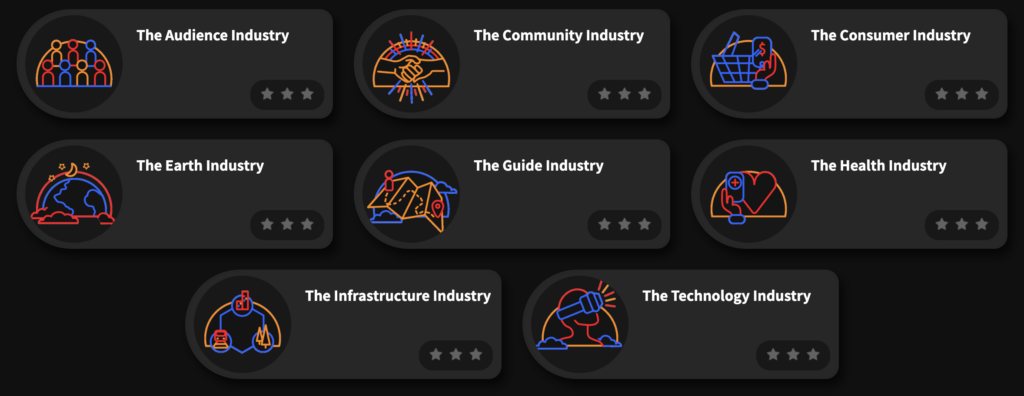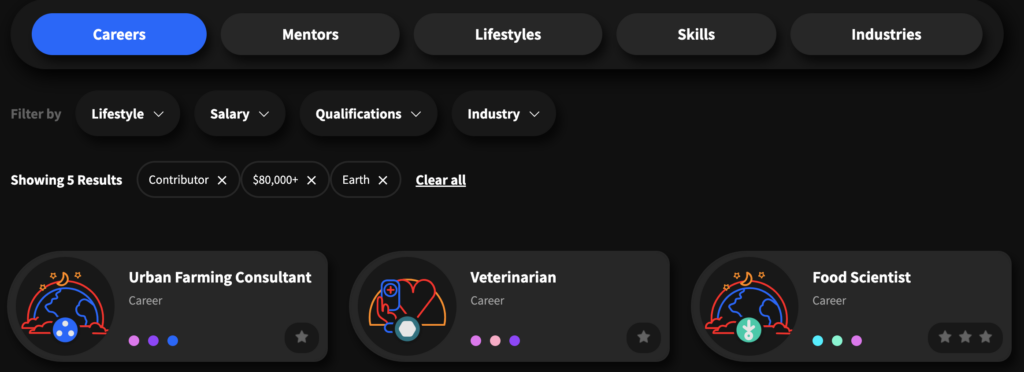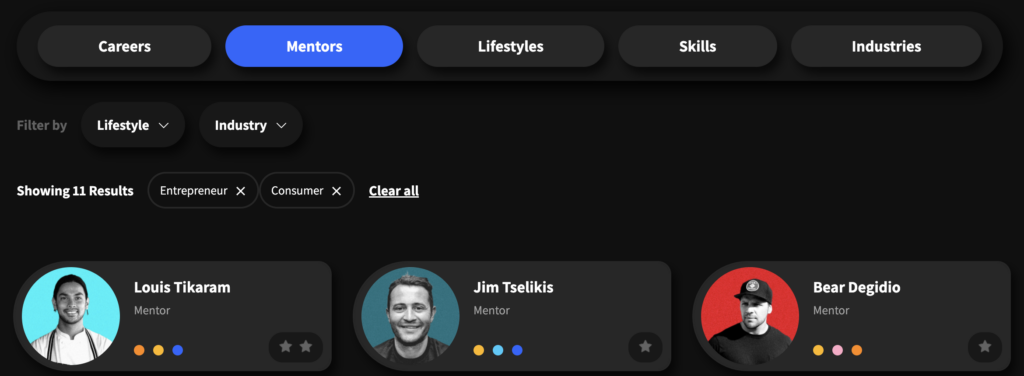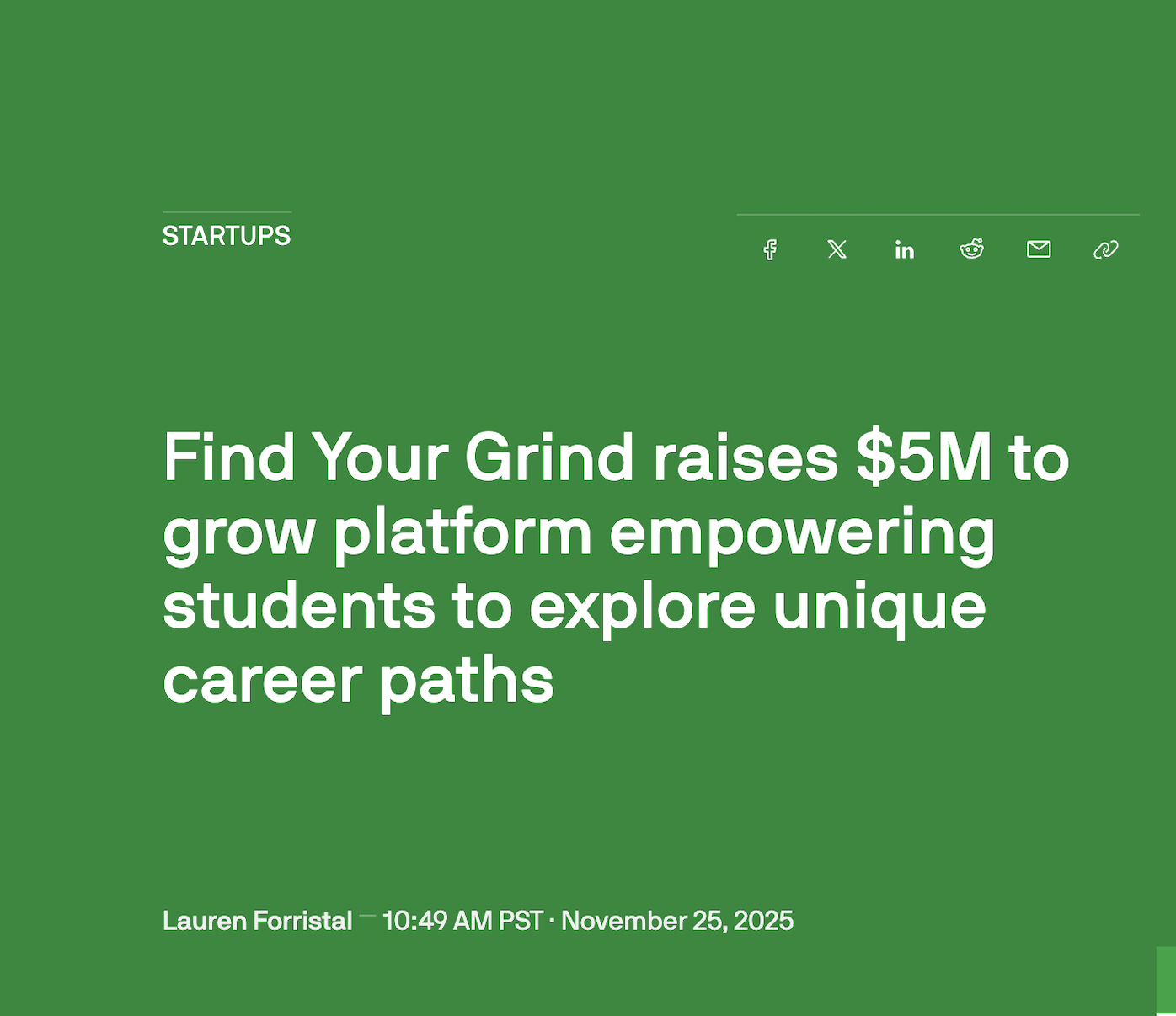May 19, 2022 | Jay Stansell
Spring Feature Launch

We’ve been busy actioning some of the most requested asks from our partners, and we’re very excited to share some of our latest features that you’ll find in the Find Your Grind learning solution.
In this post you’ll learn more about:
- Find Your Grind Industries have arrived!
- Helping Students Consume Content
- Career Filtering
- Mentor Filtering
- Change Class Names
Find Your Grind Industries have arrived!
The FYG Industry Categories are unique to FYG and support our philosophy of helping individuals discover who they are, where they’re going, and the first steps to get there. Inspired by the beat of our own drum, our resistance to outdated categories, and the hopefulness of the future, our learning design team applied a careful analysis of labor market data sources to formulate our own line-up of categories that align with our FYG ethos. It is our intention to inspire and engage our users to be agents of change for their futures.
FYG used extensive research to ensure we were using the most accurate and forward-thinking resources available to organize our current career framework into relevant and valid industry groups. Sources like the National Career ClustersⓇ Framework, U.S. Bureau of Labor Statistics’ Occupational Outlook Handbook, the U.S. Department of Labor/Employment and Training Administration’s O*NET Online website, and the U.S. Bureau of Labor Statistics Standard Occupational Classification (SOC) System all played a part in the creation of the FYG Industry Categories list. To inspire our forward-thinking approach, we have coupled these traditional industry classification sources with the latest research in the future of work, economic disruption, automation, and global education from sources like the World Economic Forum, Forbes, LinkedIn, Gartner, Deloitte, McKinsey, and Holon IQ.
In support of our philosophy, FYG realized that simplifying governmental industry frameworks was essential to reaching and capturing the attention of young people across the country. Grouping industries into eight categories make the list more manageable for users to navigate the vast amount of career information available, a strategy consistent with our design principle of simplifying content consumption. The eight industry categories align with FYG and the Future of Work Position Statement. The categories align to new and dramatically changing career pathways that are blending and becoming non-linear thus focusing more on skill sets and experience, particularly in high-growth careers. Our FYG industry taxonomy is relevant to the future of work and provides a more accessible, user-friendly, and less intimidating approach to career exploration. This approach facilitates a lifestyle-first alignment of career industries to strengths and interests, to champion our framework and promote applied learning. This allows learners to more quickly align their identified lifestyle with the industry category that is most closely related to their strengths and interests.
FYG uses the industry categories throughout our product as a metadata feature for alignment of content, personalization, and user experience design. The categories also inform our content and digital asset creation strategy in terms of module development, new career profiles, new mentor profiles, video assets, podcasts, and other marketing content. In this time of unprecedented changes in jobs and the job market, having a more streamlined list will allow FYG’s Learning Design team to more readily identify where emerging careers fit in the future of work.

Helping Students Consume Content
Through our quantitative analysis and qualitative research, we identified that not all students were fully reading texts before proceeding to the next page of a learning activity. We sat down with learners and educators in December to better understand why this occurs, while identifying some learner-friendly approaches to resolving this.
The result is that we now programmatically load a dynamic timer around the “next screen” button, waiting for the learner to finish reading the page before unlocking the button for the user to proceed.
We’ll monitor our data to review how long it now takes learners to complete activities and compare this to controlled cohort data to measure the impact.
Career Filtering
With 260+ careers of the present and the future on Find Your Grind, and with career badges among our most engaged learning content, we’ve now added the ability for users to quickly filter careers based on their interests.
Users can now filter careers by lifestyle, salary, expected qualifications, and industry.

Mentor Filtering
Find Your Grind mentors are also among our users’ favorite learning experiences. With 160+ mentors bringing to life careers through storytelling, it was time to enable users to filter these storytellers.
Users can now filter mentors by lifestyle and industry, making it much faster and easier to find mentors who have similar lifestyles and fields of interest to you.

Change Class Names
It’s a simple one, but a valuable one. About once a month we get a request to change a class name. Now, educators and co-educators can change the names of classes they have created.

To learn more about Find Your Grind’s spring feature launch, contact us.


